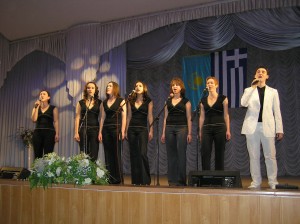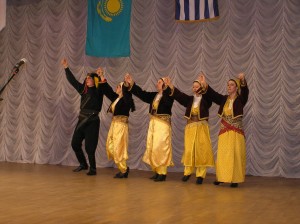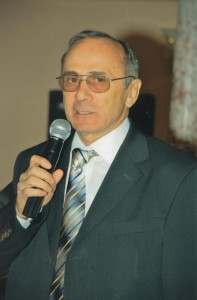ASTANA – Kazakhstan’s multi-vector foreign policy has long roots in history, as Kazakhs throughout time have been hospitable and giving. Even today, the country maintains a balanced stance among the Central Asian countries located among such diverse nations as China, Russia and, via the Caspian Sea, Iran. So Kazakhstan’s efforts to maintain a multicultural policy within its borders have historical precedent.
There are more than 130 nationalities living in the country. Among these nationalities are Greeks, who since Kazakhstan’s early independence years have established their own association under the auspices of the Assembly of the People of Kazakhstan (APK).
Like many nationalities in Kazakhstan, the Greeks have a unique and yet somewhat story to tell about their lives and history in Kazakhstan as ethnic groups such as Germans, Koreans, Chechens, and many others found themselves in this country also through Soviet-era deportations. And Pavel Feodoridi, president of the Greek Association of Kazakhstan “Filiya” recently sat down with The Astana Times to tell the story of Greek culture and history in the Kazakh steppe.
“The largest number of Greeks arrived in Kazakhstan during the deportation in 1944,” said Feodoridi referring to the eviction from the Caucasus in southern Russia and Crimea. “About 60,000 Greeks faced deportation, and back then they were settled in the Pavlodar and Kyzylorda regions.”
“After WWII there was a second wave of deportees in 1949 and also some from the Stavropol and Krasnodar regions in Russia, Abkhaziya and Georgia. These people mostly settled in the southern areas and the Kentau settlement was mostly built by Greeks. Seventy percent of the population of Kentau used to be Greek. There was also a third wave in 1951 from today’s territory of Chechnya, but the numbers were small.”
According to Feodoridi, they were mostly descendants of the Pontic Greeks, who lived in Turkey and then fled to Russia to avoid genocide in early 20th century.
 “Kazakhstan was not ready to receive such large numbers of settlers. There were no proper living conditions and no housing for the newcomers and they were spread out to live with local families. At first, of course, this news was taken as a challenge but afterwards Greeks realised that these people [Kazakhs] were very hospitable, hardworking and had a similar mentality,” said Feodoridi.
“Kazakhstan was not ready to receive such large numbers of settlers. There were no proper living conditions and no housing for the newcomers and they were spread out to live with local families. At first, of course, this news was taken as a challenge but afterwards Greeks realised that these people [Kazakhs] were very hospitable, hardworking and had a similar mentality,” said Feodoridi.
Feodoridi explained that the first Greek settlers in Tsarist Russia were mostly tobacco merchants but after the Soviet deportations they were engaged in all areas to literally help build Kazakhstan, as many took up professions in construction and as medics and teachers. Among them was the prominent Akim Atmachidi (1937-2013), Kazakh national hero, honoured construction worker and honoured citizen of Semey.
Throughout the Soviet years, Greeks were a well-recognised and respected community known for their hard work. They managed to live through the communist Perestroika in the late 1980s, but then in the early 1990s “Greeks started going back to Greece. Although Greece didn’t have a supportive repatriation programme, such as the Germans, some 31,000 of them departed for their motherland; 20,000 of them were from southern Kazakhstan, the largest concentrated population at the time,” Feodoridi said.
Facing the challenge of long distances in Kazakhstan, the ninth largest country by territory in the world, Greeks had to stay connected to keep their community and identity, to continue the legacy of their ancestors and most importantly, retain their language.
“In 1993, we established the Greek association based on three communities in Almaty, Shymkent and Taraz. Today, the association counts 17 city communities across Kazakhstan with on average about 10,000 Greeks still living here,” said Feodoridi.
The association participates in APK’s events and runs Sunday Greek language schools within city communities.
 “Before the crisis in Greece, we were supported with books and finances from Greece. We even published our own community newspaper, but now unfortunately we don’t get as much support,” the Greek association president said.
“Before the crisis in Greece, we were supported with books and finances from Greece. We even published our own community newspaper, but now unfortunately we don’t get as much support,” the Greek association president said.
“I am the second generation Greek in Kazakhstan and I am fluent in Greek. I have four children and the youngest don’t speak as well. But my oldest daughter lives in Greece and from time to time she returns to Kazakhstan. One should see her eyes when she visits her old school; they are full of joy and then nostalgia,” he said.
“It is hard to explain. I have been to Greece on numerous occasions. But I must say, we are, perhaps, Soviet people,” he continued. “Greeks in Greece have a different mentality. It was hard to understand them at first, as it was hard to get used to the country in general. My children might want to move but it’s their business and I won’t stop them. But we [the generation born in Kazakhstan] will stay here, this is our home no matter what happens,” Feodoridi said. “Look at the Ukrainian crisis right now. It all started because of the ethnic-belonging issues. Kazakhstan is a unique place, so many people were deported at one point to the steppes here and all nations got along well with one another and all respected each other. I am sure there are certain cases but it doesn’t reflect the whole situation in the country. I would say that the creation the APK by President Nursultan Nazarbayev was the right step in internal policy.”


